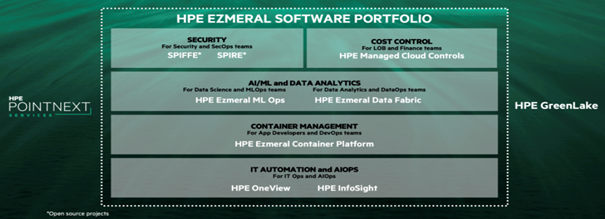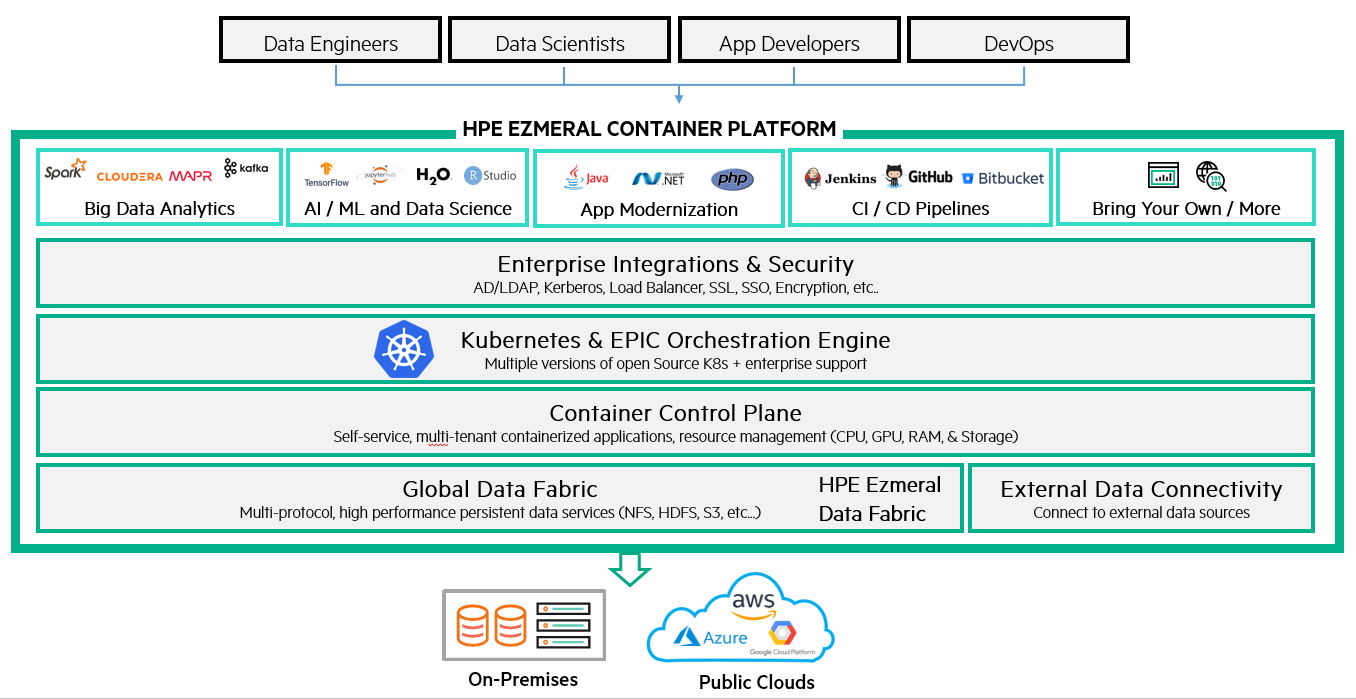# Solution Overview
This solution is built by deploying the HPE Ezmeral Container Platform on HPE ProLiant DL360 and DL380 Gen 10 Servers with multiple local disks setup for Ephermeral and persistent storage. HPE Ezmeral Data Fabric for Kubernetes provides persistent storage for this solution.

Figure 2: HPE Ezmeral software portfolio overview
# HPE Ezmeral Container Platform 5.2 Overview
The HPE Ezmeral Container Platform is a unified container platform built and designed for both cloud-native applications and stateful analytics applications running on any infrastructure either on-premises, in public clouds, in a hybrid model, or at the edge.
HPE Ezmeral Container Platform installs as a software layer between the underlying server infrastructure and the Big Data distribution, AI/ML libraries, and applications. The use of Docker is completely transparent and HPE Ezmeral Container Platform customers benefit from the greater agility and bare metal performance due to the light-weight nature of the containers. Customers can leverage the flexibility of the containers to simplify development for DevOps, CI/CD pipelines, and application modernization across hybrid cloud deployments.
The HPE Ezmeral portfolio allows you to:
Run containers and Kubernetes at scale to modernize apps, from edge to cloud
Manage your apps, data, and ops -- leveraging AI and analytics for faster time-to-insights
Ensure control for governance, compliance, and lower costs
Provide enterprise-grade security and authentication to reduce risk
Figure 3 shows the high-level HPE Ezmeral Container Platform architecture.

Figure 3. HPE Ezmeral Container Platform architecture
HPE Ezmeral Container Platform 5.2 includes the following new features:

Figure 4. HPE Ezmeral Container Platform 5.2 What's New
AI/ML projects in Kubernetes: Version 4.0 introduced a dedicated artificial intelligence/machine learning (AI/ML) interface and workflow. Version 5.0 added support for Kubernetes pods, tenants, and clusters. Version 5.2 combines the two by adding the AI/ML workflow and interface to Kubernetes clusters. See about HPE Ezmeral ML Ops (opens new window) and Getting Started with AI/ML in Kubernetes (opens new window).
HPE Ezmeral Data Fabric in Kubernetes: You may now add dedicated Data Fabric nodes and then create dedicated Data Fabric clusters in Kubernetes and then register those clusters to act as tenant/project storage for the entire HPE Ezmeral Container Platform deployment. See about HPE Ezmeral Data Fabric (opens new window).
Istio: Kubernetes clusters and tenants may now include the Istio service mesh. See about Istio (opens new window).
Enhanced Kubernetes cluster import: HPE Ezmeral Container platform expands support for importing external Kubernetes clusters hosted on a variety of cloud platforms. See Importing an External Kubernetes Cluster (opens new window).
Custom default password: You may specify a custom default password when installing HPE Ezmeral Container Platform. See Standard Installation (opens new window).
UEFI boot support: You may now install HPE Ezmeral Container Platform on hosts with the UEFI boot feature enabled.
Livy support: Livy support is integrated with HPE Ezmeral Data Fabric, provided that HPE Ezmeral Container Platform is configured to use Kubernetes Data Fabric clusters during installation, and not the embedded version of HPE Ezmeral Data Fabric. See Platform Controller Setup. (opens new window)
# HPE Ezmeral Container Platform Controller
HPE Ezmeral Container Platform Controller is installed and configured on 3x HPE ProLiant DL360 Gen 10 Servers with multiple local disks setup as raid for platform-level high availability functionality that protects HPE Ezmeral Container Platform against the failure of the Controller host. Platform-level high availability requires two designated Ezmeral worker hosts, such as Shadow Controller and Arbiter (for non production test/dev environments single controller deployment is supported).
# HPE Ezmeral Data Fabric for Kubernetes Cluster
#
Consists of a bare metal Kubernetes cluster built on top of 3x HPE ProLiant DL360 Gen10 Server Compute Module as master nodes and 5x HPE ProLiant DL380 Gen10 Server as workers where the HPE Ezmeral Data Fabric is created. The deployment of Kubernetes clusters is achieved using the proven HPE Ezmeral Container Platform software.
# Persistent Storage
Persistent volume for the cluster is available from the native HPE Ezmeral Data Fabric for Kubernetes.
# Gateway load balancer
Gateway server provides a connection to HPE Ezmeral Container Platform-managed Kubernetes cluster services. All public service endpoints in KubeDirector- managed Kubernetes clusters will be exposed via HPE Ezmeral Container Platform Gateway re-mapped ports. Redundancy for Gateway hosts is provided by creating two gateway servers. This is done by mapping multiple Gateway host IP addresses to a single hostname. This ensures that there is no single point of failure for the Gateway host. When this is done, either the DNS server or an external load balancer will load-balance requests to the hostname among all the Gateway hostson a round-robin, least connection, etc. basis.
NOTE
HPE Ezmeral Container Platform Gateway load balancer (LB) nodes are deployed on physical machine.
# HPE Ezmeral Data Fabric for Kubernetes
The HPE Ezmeral Container Platform out of the box supports the installation and configuration of the persistent data fabric for AI and analytics and K8s workload. This persistent volume is provided by HPE Ezmeral DataFabric which is a distributed file and object store that manages both structured and unstructured data. It is designed to store data at an Exabyte scale, support trillions of files, and combine analytics and operations into a single platform. It supports industry-standard protocols and APIs, including POSIX, NFS, S3, and HDFS. With production-ready capabilities like policy-based data tiering, consistent snapshots, and mirroring, the persistent data fabric serves as the enterprise standard for meeting stringent storage and processing SLAs across on-premises, hybrid cloud, and edge deployment.

Figure 5. HPE Ezmeral Container Platform solution layout on HPE ProLiant DL Gen10 Servers
All applications running in containers will be able to natively access data across the fabric through DataTaps as well as through FSMount. K8s persistent volumes will be seamlessly available across clusters from this persistent data fabric.
In this solution, HPE Ezmeral Container Platform Controllers, Gateway load balancers, Kubernetes master nodes and Kubernetes worker nodes are deployed on HPE ProLiant DL360 & DL380 Gen10 Servers running SUSE Enterprise Linux 15 SP2.
Figure 5 describes the minimal configuration of HPE Ezmeral Container Platform deployment on HPE ProLiant DL Servers along with HPE Ezmeral Data Fabric without the kubernetes compute cluster.